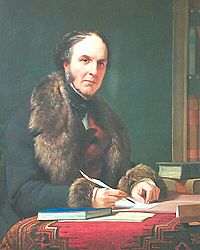Royal Commission into the Operation of the Poor Laws 1832 facts for kids
The 1832 Royal Commission into the Operation of the Poor Laws was a special group. It was set up to figure out how to change the old Poor Law systems in England and Wales. These laws were about helping people who were very poor.
The group included Nassau Senior, a professor from Oxford University. He did not like the old system where poor people got money or help while staying in their homes. Another important member was Edwin Chadwick, who followed the ideas of Jeremy Bentham. The ideas from this group's report led to a new law called the Poor Law Amendment Act 1834.
Contents
Setting Up the Commission
On February 1, 1832, the government announced this new Royal Commission. This happened in the House of Commons. At first, the group had seven main leaders and sixteen helpers. In 1833, two more leaders joined the main group, making nine in total.
The helpers were sent all over England and Wales. Their job was to gather information about poverty. They visited local areas called parishes. They also sent out questions for people to answer. The main leaders then used all this information to write their report.
The findings from the Poor Law Commissioners started to come out in February 1833. These findings were used to argue that the old system of helping the poor needed big changes.
Who Was in the Group?
The nine main leaders of the Commission were:
- Charles James Blomfield (who was a Bishop) - He was the chairman.
- William Sturges Bourne (who led an earlier group in 1817)
- John Bird Sumner (another Bishop)
- Nassau Senior
- Walter Coulson
- Rev. Henry Bishop (from Oriel College, University of Oxford)
- Henry Gawler
- James Traill
- Edwin Chadwick (who was the secretary)
The first seven people were chosen in 1832. The last two, James Traill and Edwin Chadwick, joined in 1833.
What They Suggested
The people who wrote the report suggested big changes to the English Poor Laws:
- They wanted separate workhouses for different groups of poor people. For example, old people, children, healthy men, and healthy women would each have their own place.
- They suggested that local areas (parishes) should join together. This way, they could share the cost of building and running workhouses.
- They wanted to stop "outdoor relief." This meant that poor people would no longer get help or money if they stayed in their homes. Instead, they would have to go into a workhouse to get help.
- They wanted a central group to make sure the new rules were followed everywhere. This would stop different areas from doing things their own way, which happened under the old system.
Why Some People Criticized It
Some people believed that Nassau Senior might have written parts of the report even before all the information was collected. They thought that the information was then chosen carefully to fit what the report already said.
Only about 10% of the questionnaires sent out were returned. Also, some of the questions seemed to push people towards a certain answer. However, the group was not meant to be completely fair. They wanted to change the old system, and keeping it as it was, was not an option for them. The questions they used were sometimes confusing or led to answers that were not clear.
Today, many people think that the report was not very accurate. Most of the help given out by the old Poor Law was for people who could not work. This included children, the sick, or the elderly. The report, however, focused a lot on healthy people who they thought were just choosing not to work.
Only about 20% of the 12 million people in England and Wales were getting poor relief. Out of those, only 20% were healthy adults. About half were children under five. Another 9% to 20% were sick, old, or unable to work. This showed that many of the ideas in the report about lazy people were not true.
Marjie Bloy, a historian, explained that the Commissioners thought employers and workers were equal. But they were not. The Commissioners believed the old system let some employers pay very low wages. This was because they knew workers could get help from the Poor Law if they needed it. It was also thought that poverty would always exist, so they did not try to fix the root causes of it.
They hoped that strict workhouses would make poor people want to find work instead of going to "the House." But in many rural areas, there was not much work to be found. This meant the whole idea behind the new law was not very strong.
Sources
Bryan Green. Knowing the Poor. A Case Study in Textual Reality Construction. London: RKP, 1993
 | Janet Taylor Pickett |
 | Synthia Saint James |
 | Howardena Pindell |
 | Faith Ringgold |


